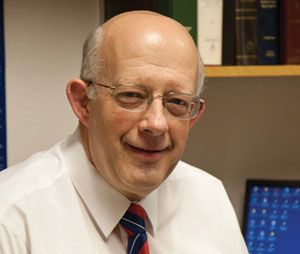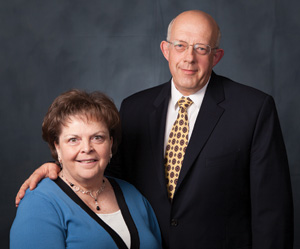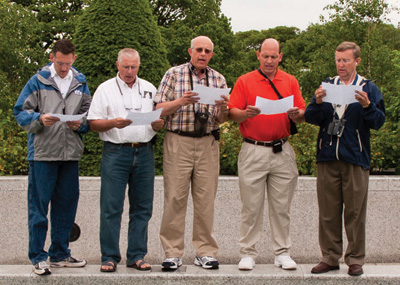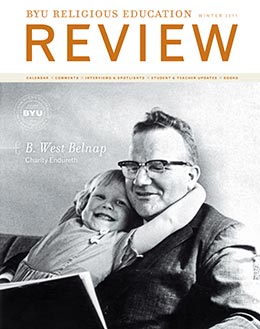Clyde J. Williams (cwilliams@ldschurch.org) was assistant director of the Evaluation Division of the Correlation Department when this was written.

If you had told me four months ago that I would be leaving BYU and doing what I am doing now, I would have told you, “You are out of your mind!” In late June, I got a phone call asking if I would come in for an interview with Elder Bruce D. Porter of the Seventy. I was aware that Ed Brandt was retiring from correlation. I knew they had already talked to some people. When I went into Elder Porter’s office, he asked me if I would be interested in being considered for this position. I said to him, “Elder Porter, if you put it that way, absolutely not. Why would I want to leave teaching religion at BYU? Now, if it is a calling, then I’ll salute and it’s done.” I’m sure my answer was a surprise, but that was how I felt. Then he asked, “Would you be willing to pray about it?” I said, “I will do that.” As I got ready to leave, he said, “Now, you need to know that when we asked President Packer for any names, he gave us one name, and it was yours.”
I thought I knew what I was going to do, but I wanted it to be easy and have somebody say, “We have hired somebody else, and you’re free to go.” In a way I wanted to hang on to what I had at BYU. As I was wrestling with this decision, I realized that I had become comfortable in my teaching. I had become so adjusted and so at ease that I was really not allowing myself to be stretched and to grow in other ways that the Lord wanted me to, and he obviously knew more about what I needed than I did.
After a trip to the temple, I began to feel impressed that the Lord had other plans in mind. It reminded me of what C. S. Lewis wrote: “Imagine yourself as a living house. God comes in to rebuild that house. At first, perhaps, you can understand what He is doing. He is getting the drains right and stopping the leaks in the roof and so on: you knew those jobs needed doing and so you are not surprised. But presently he starts knocking the house about in a way that hurts abominably and does not seem to make sense. What on earth is He up to? The explanation is that He is building quite a different house from the one you thought of—throwing out a new wing here, putting on an extra floor there, running up towers, making courtyards. You thought you were going to be made into a decent little cottage: but He is building a palace.”[1] Well, I don’t know if he’s making more of me than a glorified cottage, but the Lord knew that there were things that could move me along and make me grow in ways that I wouldn’t have chosen to do myself. What follows are some of the pivotal events and teachings that have helped to make me what I am.
One of my first major growing experiences happened when I was fourteen years old and my father passed away. It was rather sudden. Following a hernia operation, there were complications. They thought he had a kinked intestine, but when they went in they found an intestinal blockage with cancer. Somehow in the process someone spilled digestive juices back into the abdomen that threw him into shock and a short time later he died. I don’t ever remember any bitterness in our family. It was a pivotal event in my life because I was forced to make some decisions and do some things that I otherwise wouldn’t have done. As the oldest son in the family, I had experiences that otherwise would not have come to me.

My years as a missionary changed my life. While serving as a missionary, I wanted to help and lift my fellow missionaries, especially some who were struggling or feeling like a failure. Those experiences helped me to be more sensitive to other people.
One day in the mission field, I had a question that I thought was worthy of an Apostle’s answer, so I wrote to Elder Spencer W. Kimball (this was before the letters cautioning us not to write to the General Authorites). He wrote back giving me an answer to my question. Later, Elder Kimball came to England on a mission tour. When he arrived at the Cardiff, Wales, chapel and spoke to the missionaries there, I was in the audience. As a part of his address, he cautioned missionaries about writing to the general authorities and counseled us to write to our mission president. Of course, at that point I was listening as if he were addressing me personally. Then he taught this important principle: “Now, elders, when you come to a question or something you don’t understand and you’ve studied and searched it out a bit and you don’t have an answer, don’t throw up your hands in despair and become all fixated and frustrated about it,” he said. “Take it and put it on the shelf. Set it aside for a time. Go on in your living and learning and studying the gospel. Invariably you’ll come back to it later, and when you take it down from the shelf you’ll now find you have the means wherewith to answer or resolve that question.” I have used that advice throughout my life. I wish my food storage shelf was as well rotated as my gospel-question shelf.
My desire to become a seminary teacher was born out of my mission experiences. The last four months of my mission, Elder John Madsen, formerly of the Seventy, was my mission president. His enthusiasm for the gospel and his desire to teach with power impacted me and caused me to think, “I’d like to do that myself.” I also made a determination that I would continue to dress like a missionary on Sundays. It wasn’t a written rule that I had to do that; it was just me, and it has impacted my life ever since that time, including how I dressed as a religion teacher.
In 1981 I was asked to write curriculum for Seminaries and Institutes. It was a wonderful experience, but after five years I felt like I was becoming a little stale and needed a change. I came home and talked about it with my wife. On Friday we decided to fast and go the temple to ask the Lord for some direction. Saturday morning the phone rang. It was Robert J. Matthews, then dean of Religious Education at BYU. I had taken a class or two from him over the years, but I did not know that he knew me from Adam. He came to our home that Sunday evening and told me how he had an impression that he should invite me to come to BYU. He added that while it didn’t matter to him if I had a doctorate, it did to the university, so I would need to commit to pursue a doctorate. I told him that I would be willing to do that. About two weeks later, I was called and invited to go with him to an interview with Presidents Holland, Ballif, and Evenson of the BYU administration. The interview went well enough that they agreed to my coming, and eventually I was officially hired as a full-time faculty member in Ancient Scripture.
My experiences writing a doctoral dissertation shaped the direction of my teaching career. President Benson had recently become President of the Church, and I kept hearing his comments about the Church being under condemnation for treating lightly the Book of Mormon. I was convinced he was right. My dissertation therefore focused on using the Book of Mormon to resolve personal problems, and that has had a major impact upon my teaching. I have wanted students to know that the Book of Mormon could help them meet life’s challenges and problems.
Over the years, I have loved and compiled the words of living prophets. While collecting the teachings of all of the prophets, I wondered why no one had done the teachings of Lorenzo Snow, and that eventually led me to pursue collecting and compiling his teachings. Remember, I did the majority of this before the days of computers and search engines.
After coming to BYU, I was encouraged by Reed Benson to pursue compiling the Teachings of Harold B. Lee. Shortly thereafter, Eleanor Knowles spoke to our faculty here about the biography of Howard W. Hunter. When asked by one of the faculty if someone would be doing a teachings book, she said that his teachings did not lend themselves to a book. That became my cue to pursue and compile a book of his teachings. When I had finished compiling these books, I was asked by some if I wanted to do any others. My response at that time was that I would love to do the teachings of Elder Packer. However, I had asked once and was told they were being done, and then seven years later, based on a prompting, I asked again and this eventually led to publication of Mine Errand from the Lord.
Over the years I have learned many valuable things from the experiences of studying and compiling these teachings books. In the interest of time, I will share just one lesson I have learned from each of these four prophetic leaders.
From Lorenzo Snow, I will share his analogy that the Church has grown from infancy to manhood. He spoke of how we, as a Church, commenced as an infant and learned from our ignorance and the opposition we faced. He said: “We advanced into boyhood, and still we undoubtedly made some mistakes, which did not generally arise from a design to make them, but from a lack of experience.” [2] He went on to say that we had moved along toward manhood. The image of the Church growing to manhood is beautiful and explains well the challenges we have faced in the past and the progress we have made and growth that has continued to take place.

From President Lee, I will share a profound statement that I hung in my office. He said, “If you want to be an effective teacher of the gospel, you have to live the principles that you propose to teach. The more perfectly you live the gospel, the more perfectly you will be able to teach the gospel.”[3] I bear witness this principle is true.
President Hunter gave counsel that is particularly relevant to those of us who are or have been teachers. He warned: “Let me give a word of caution to you. I am sure you recognize the potential danger of being so influential and so persuasive that your students build an allegiance to you rather than to the gospel. Now that is a wonderful problem to have to wrestle with, and we would only hope that all of you are such charismatic teachers. But there is a genuine danger here. That is why you have to invite your students into the scriptures themselves, not just give them your interpretation and presentation of them. That is why you must invite your students to feel the Spirit of the Lord, not just give them your personal reflection of that. That is why, ultimately, you must invite your students directly to Christ, not just to one who teaches his doctrines, however ably. You will not always be available to these students. You cannot hold their hands after they have left high school or college. And you do not need personal disciples.”[4] This counsel has proved to be very valuable to me and helped me keep a proper focus as a teacher.
Now, from President Packer, I will share a statement that I have heard many times over the years: “I will make a promise to you, and you can test it. I have no hesitancy in making this promise in your young life. . . . You cannot make a major mistake, any mistake that will have any lasting consequence in your life, without having been warned and told not to do it. It cannot be done in this Church.”[5] My life’s experience, along with so many others I know, confirms that this principle is true and it fits the doctrine perfectly. Without this, we would have little or no accountability.
Now, in conclusion, I shift my focus to the scriptures. I have, by my own design, prepared and taught three or four different courses every semester during my career here at BYU. My motive was to stay immersed in the scriptures, and I did not want to be strong in one and weak in all the others. I found that as I taught Book of Mormon, New Testament, Doctrine and Covenants, and Old Testament, there was significant cross-fertilization and interplay, and I learned so much. Teaching the subjects simultaneously kept me seeing new insights and making connections that I know I would have likely never seen otherwise. Because of those experiences, my witness of the harmony of the scriptures and the inspiration of the Prophet Joseph Smith has become ever more profound and deep. What a blessing it is to be able to teach the scriptures! I am so grateful for the opportunity to teach at BYU, and even though that opportunity was brought to an abrupt conclusion, I’m grateful the Lord has blessed me with a new opportunity to learn and grow and make a contribution to his kingdom.
Notes
[1] C. S. Lewis, Mere Christianity (New York: Macmillan, 1960), 160.
[2] The Teachings of Lorenzo Snow, comp. Clyde J. Williams (Salt Lake city: Bookcraft, 1984), 170–71.
[3] The Teachings of Harold B. Lee, comp. Clyde J. Williams (Salt Lake city: Bookcraft, 1996), 459.
[4] The Teachings of Howard W. Hunter, ed. Clyde J. Williams (Salt Lake city: Bookcraft, 1997), 187.
[5] Mine Errand from the Lord: Selections from the Sermons and Writings of Boyd K. Packer, comp. Clyde J. Williams (Salt Lake City: Deseret Book, 2008), 130–31.
